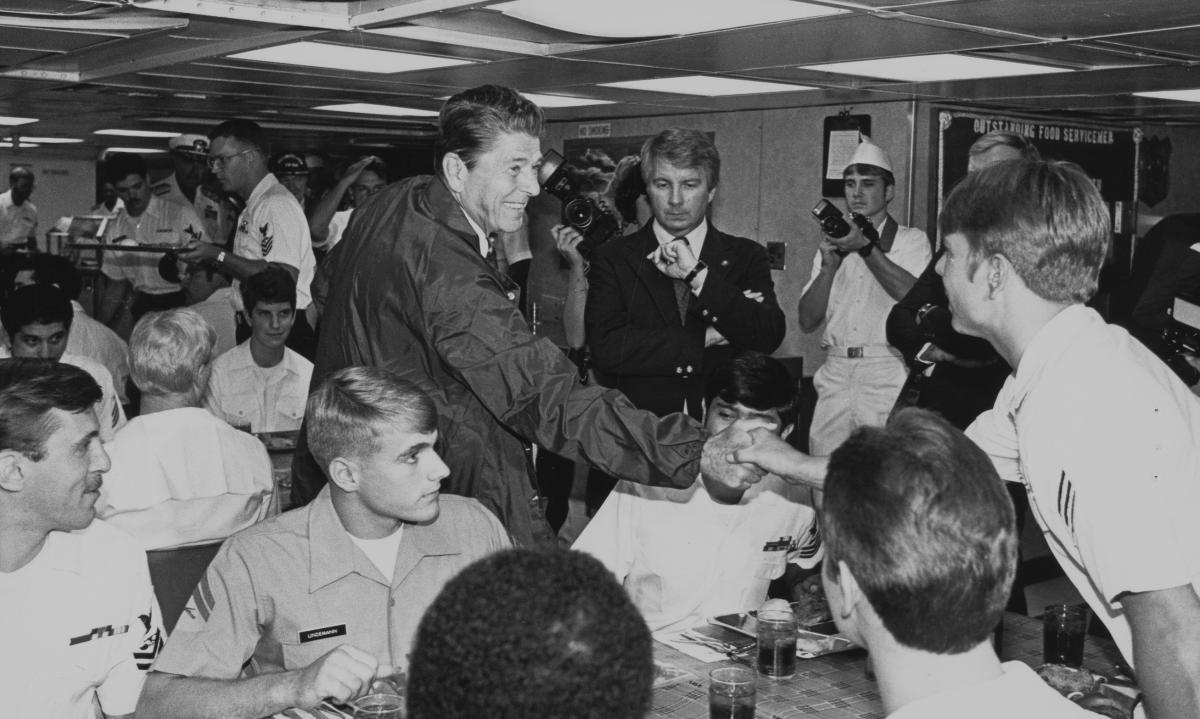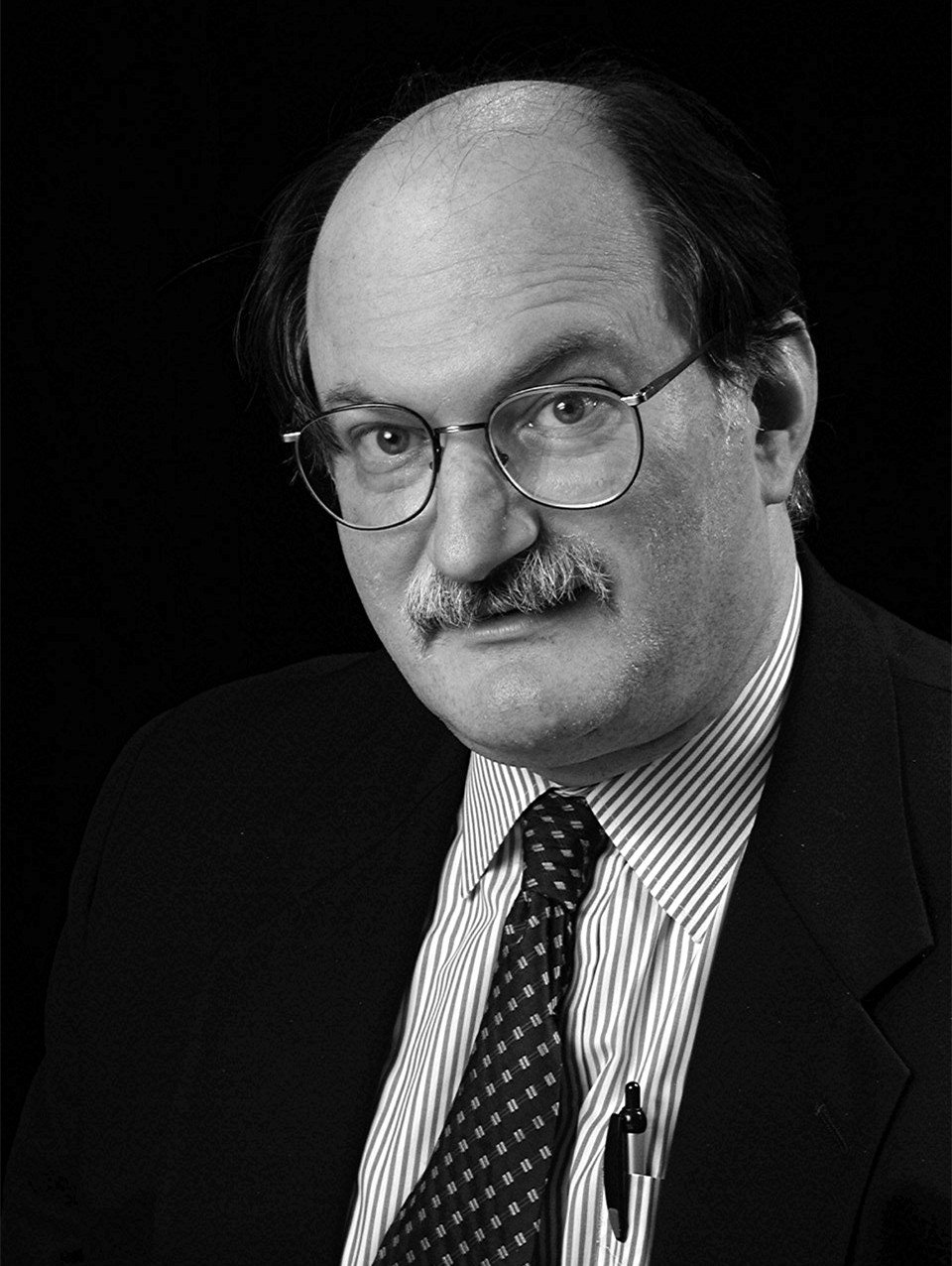Former President Ronald Reagan died the day before the 60th anniversary of D-Day. D-Day was in many ways the beginning of the end of the European phase of World War II. President Reagan's term of office saw a somewhat analogous development in the much longer and slower-moving Cold War. He had left office when the Soviet Union was forced out of Eastern Europe and then into disintegration, but it seems fair to say that his was the decisive hand. This is far more obvious in retrospect than it seemed at the time.
Naval readers remember President Reagan for regenerating the U.S. Navy; the capabilities created under his administration proved vital not only during the latter phase of the Cold War, but also during the violent peace that has followed.
When President Reagan entered office, it seemed the Soviet Union was on the march. The United States seemed unable to match Soviet confidence and raw military power. That was partly a matter of perception. Any such ideas vanished as a Soviet victory proved elusive in Afghanistan.
In 1980, few had any idea of the grave problems the Soviets confronted.
Ronald Reagan won the presidency in 1980 based largely on his willingness to reverse the sense of defeat. It was critical that he was not an insider, hence had not subscribed to, or been involved with, many of the accepted understandings of the time. Perhaps as important, he refused to accept the idea that he should maintain warm relations with the Soviet state while that state told its citizens to hate and fear the United States. Moreover, the President absorbed one absolutely crucial fact—the Soviet state was in deep trouble. If the United States applied the right pressure—and it was by no means clear what that pressure wasthe Soviet enemy might well have to give up the Cold War. It was worth spending heavily on a defense buildup if that could win the Cold War and reduce the need for defense, or at least the threat to the United States. Critics imagined that the buildup was permanent. The administration certainly talked as though it was, because it would have no effect on the Soviets if they thought they could simply wait it out.
The President did not personally plan or pursue naval rearmament, any more than he was personally engaged in any other detail of the defense program. However, he set the tone by encouraging a forward policy. That was well understood; the Navy had been arguing for years that limiting its sea control was a self-defeating waste of resources. What changed was that the President selected a secretary of the Navy, John Lehman, who was attuned to just this argument. The fleet is now a lot smaller than it was in the 1980s, but the new ships of the Reagan era, the nuclear carriers, the Aegis cruisers and destroyers, and the new amphibious warfare ships, still dominate it. As an incidental benefit, buying a fleet designed to seize, defend, and exploit sea control by offensive means meant buying the fleet that can project power to fight the terrorist war we now face.
President Reagan was extremely fortunate in his timing. His term coincided with the advent of mass-produced microcomputers. It is now clear that widespread use of computers drastically changed warfare; a force equipped with them, using them for rapid precision strikes, would outclass a more massive, slower-moving conventional force. In the late 1970s, the Chief of the Soviet General Staff, Marshal Nikolai Ogarkov, was writing that it was essential that the Soviets secure this technology; otherwise they would be outclassed. Americans who were used to easy access to the new technology appear not to have realized just how devastating Ogarkov's remarks were. In 1980, the Soviets lacked the necessary computer industry. To meet Ogarkov's demands, they would have to open their economy, which in Soviet terms meant tearing open their society as a whole.
Ogarkov's demand could be staved off as long as it seemed that the West was not applying much pressure. President Reagan's rearmament, which involved the new computerized systems, made Ogarkov's remarks urgent rather than theoretical. Soviet society was highly militarized. Reform of military industry became a requirement, delayed only because of the leadership crisis the Soviets faced in the early 1980s. We now know that Mikhail Gorbachev sold his candidacy to the Politburo by claiming he would solve the military computer production problem-not the larger evident problems of Soviet society.
Because he was aware that he was on the wrong side of a technological revolution, through the late 1980s, Mr. Gorbachev found himself accepting a variety of political defeats at American hands. One irony was that neither President Reagan nor other senior Americans seem to have realized just how strong their position was. Perhaps they simply noticed how weak Mr. Gorbachev clearly felt he was.
Mr. Gorbachev clearly needed a breather in the Cold War while he repaired Soviet industry. Past Presidents had welcomed various forms of detente, during which the Soviet government had made sure its public gained no illusions about the imminent end of the Cold War. To Ronald Reagan, such two-faced behavior was anathema. Why support a repressive Soviet government so that it could strengthen itself to resume its own threatening behavior later? If Mr. Gorbachev wanted detente, that was welcome, as long as detente extended inside the Soviet Union.
One key implication was that Gorbachev could not use the American menace to mobilize Soviet workers. he had to find some other incentive. Eventually he decided that relaxing the power of the Soviet state could encourage creativity and production. To his surprise, those given voice were interested in ending the Soviet system. It was Ronald Reagan's insistence that detente had to be internal as well as external that made it impossible for Gorbachev to stuff this genie back into its bottle. Gorbachev did survive the end of Ronald Reagan's administration, but by early 1989 he was in deep trouble. Some of his colleagues recognized that he was destroying the Soviet system, and apparently they prepared to unseat him. he decided to destroy them, and also the Communist Party structure that seemed to be holding back progress.
It now seems that Gorbachev realized his domestic enemies might take refuge in rigid satellite governments, particularly in East Germany and in Czechoslovakia. Gorbachev had always been connected with the KGB, and he seems to have used his security service to foment an East German coup. Rather than strengthening him, it was the beginning of the end of Soviet power in Europe. When the new regime gained power, its members were shocked to discover that East Germany was effectively bankrupt. Gorbachev had little foreign exchange to provide, so the regime had to turn to West Germany. The West Germans agreed to a loan, conditioned on some liberalization of border policy. The new regime panicked and opened the border, tearing down the Berlin Wall.
Gorbachev apparently did not realize this was the beginning of the end of East Germany. Instead, he seems to have focused on the need to deal with his domestic opponents. Thus, he seems to have ordered a similar coup in Czechoslovakia and possibly also the coup in Romania. In each case, the local population pressed for change, but they would not have done so in the past. Clearly there was some official encouragement.
The pressures that Ronald Reagan imposed on the Soviets were crucial. His support for Afghan guerillas demonstrated the limits of Soviet military power and thus greatly devalued the Soviet military and police forces that maintained Soviet rule both in the Soviet Union and in the East European empire. We now see an unintended consequence of this support in al Qaeda terrorism against us, but surely the threats the terrorists impose are far less horrific than the widely accepted Cold War threat of imminent large-scale nuclear war.
Economic warfare against the Soviets helped make it almost impossible for them to save their position in Eastern Europe simply by spending money, as they had in the past. The East German panic was the most extreme example of this failure. Much of the ongoing Soviet disaster in Poland can be ascribed to economic disaster there. Evident American resolve, and the understanding of just how disastrous Afghanistan was proving, dissuaded several Soviet rulers from trying armed intervention in Poland. Failure in Poland in turn encouraged others in Eastern Europe to imagine that the long Soviet-imposed night might well be ending. It seems unlikely that any of this would have happened had Ronald Reagan not been President.
American rearmament imposed its own pressures, particularly on Mikhail Gorbachev, who understood his new military inferiority. It was not that the United States outspent and thus impoverished the Soviet Union. In terms of numbers of aircraft, tanks, and other arms, as late as 1989 the Soviets were probably outproducing the United States. The trouble was that those numbers were no longer very relevant. What counted was new technology. Even if the numbers still favored the Soviets, quite soon they would not. "Star Wars" added to the pressure because it threatened the area in which the Soviets felt superior, strategic nuclear weapons.
This ending was by no means preordained. Had the U.S. government shown no aggressiveness after 1980, the Soviets would not have found military industrial reform urgent. Without President Reagan's insistence that detente be real, they might have been able to create the new industry in some way reminiscent of Joseph Stalin's forced industrialization. In the 198Os, they still felt confident enough to press ahead in places as widely separated as Nicaragua and Afghanistan. There was no evidence that they were particularly anxious to abandon the Cold War or the hope of ultimate victory in it. Nor is there evidence that they were losing their desire to neutralize and ultimately swallow Western Europe. The United States might well have found itself increasingly isolated and, therefore, with drastically declining morale.
Obviously U.S. strategy could have been executed more effectively, because whatever was done in the 198Os could have benefited from much better knowledge. But the offensive inspired by President Reagan worked. Against much opinion, he persistedand he won. That victory ended an absolutely terrifying threat, which might well have wiped out much of the population of this country. Nothing in the uncertain world we now face is nearly so bad.





